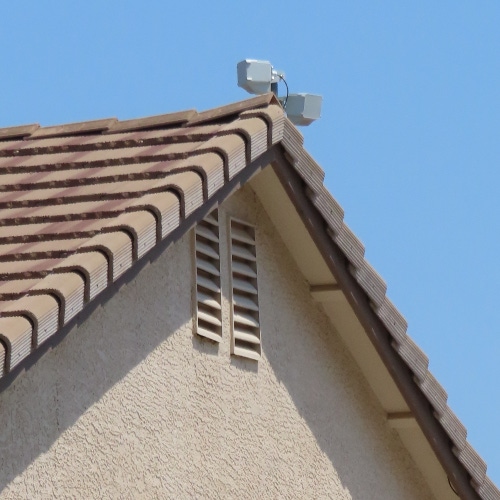
UScellular added Samsung to its network vendor lineup in 2020 – alongside existing vendors Ericsson and Nokia – when it embarked on a program to construct a 5G network in its lowband and highband millimeter wave spectrum holdings. However, Samsung is not among the vendors for UScellular's new plan to add midband spectrum to its 5G network.
In response to questions from Light Reading, UScellular confirmed that it will use equipment from Nokia and Ericsson to deploy 5G services on its midband spectrum holdings. The operator spent a total of around $1.9 billion across two recent FCC midband spectrum auctions: Auction 107 for C-band and Auction 110 for 3.45GHz-3.55GHz (which Light Reading is calling the "Andromeda auction").
UScellular said it plans to begin its midband 5G buildout in 2023 and predicted the effort would take several years to complete.
Figure 1:  UScellular transmits its signals from atop cell towers.
UScellular transmits its signals from atop cell towers.
(Source: UScellular. Used with permission.)
The operator also confirmed that it plans to deploy integrated radios that can support both C-band and Andromeda spectrum in the same device. In doing so, UScellular is essentially using the same playbook as T-Mobile, which recently said that it plans to wait until 2023 to deploy its own C-band and Andromeda spectrum holdings in order to use integrated radios. AT&T, on the other hand, said it plans to start deploying its C-band and Andromeda spectrum later this year but will do so with separate radios, one for each band.
T-Mobile and AT&T are using the same vendors as UScellular – Nokia and Ericsson – for their midband 5G buildouts. T-Mobile's midband network will eventually stretch across 2.5GHz, C-band and Andromeda spectrum, whereas AT&T's will incorporate C-band and Andromeda spectrum. However, Verizon ditched Nokia as a vendor and is using equipment from Ericsson and Samsung for its ongoing midband 5G buildout, which primarily relies on C-band spectrum.
Deciding to move
UScellular did not say how much it plans to spend on its new midband 5G spectrum buildout. Such spectrum has been widely touted as ideal for 5G in that it can cover wide geographic areas and provide speedy connections. UScellular counts roughly 5 million mobile customers in the US with a wireless network covering parts of 21 states.
In announcing its midband 5G deployment plans this week, UScellular appears to have decided to move 5G forward to maintain pace with its rivals. Earlier this year, company officials told Light Reading they wouldn't deploy their midband 5G spectrum holdings "prematurely."
Specifically, UScellular CTO Mike Irizarry said in March that the operator would "respond accordingly" on rolling out midband spectrum licenses. At the time, he declined to provide a firm launch date, saying, "We're keeping our ear to the ground about what our competition are doing."
Now, it appears that Irizarry has made a decision to move forward with a midband buildout.
Finally, in response to questions from Light Reading about whether UScellular's midband 5G equipment might support open RAN specifications, a company official wrote that the operator's "product roadmap supports features of ORAN."
Related posts:
— Mike Dano, Editorial Director, 5G & Mobile Strategies, Light Reading | @mikeddano
About the Author(s)
You May Also Like












